AOP survey on supervision in optics
Supervision issues in optics: findings of two member surveys
The Association of Optometrists (AOP) is the leading representative membership organisation for optometrists in the UK, representing over 80% of optometrists. Our membership also includes registered optometry students, pre-registration trainees and some dispensing opticians.
From time to time we hear that our pre-registration student members have concerns with the quality of the supervision they receive, and that those who take on supervisor duties don't always feel fully supported by their employers.
Those concerns surfaced again last year when we sought views from our members about potential developments in optometry education, including the GOC's Education Strategic Review (ESR) which would involve changes to the current arrangements for student clinical placements and a proposal for a degree apprenticeship. Many members told us that given their own experience of supervision, they thought these proposed developments could pose risks to patient safety and public confidence.
The issues raised included:
- Pre-registration trainees feeling abandoned and unsupported
- Supervisors who were, in the trainees' view, too-newly qualified or, conversely, out-of-date
- Trainees feeling pressured to contribute to the practice bottom line before they felt confident in what they were doing clinically
About the surveys
To better understand these concerns and the scale of the problems, we carried out two surveys in July 2020:
- The first survey was of pre-reg trainees, and was aimed at current trainees and those who had qualified in the last five years, because we wanted to be sure that the evidence we were gathering was about recent experience, but including experience before COVID-19
- We also surveyed supervisors in order to understand their experience
There were 210 respondents to the pre-reg survey (all of whom were currently training or qualified within the last five years) and 166 to the supervisors' survey. These numbers are sufficient to be indicative of the general picture.
We are publishing this summary of the findings as an important contribution to the current debate around changes to optometrist education. In particular, our members' experiences, as reported in the survey, demonstrate the need for any changes to be properly funded, in the same way as in other healthcare disciplines, to ensure that newly qualified optometrists are safe and ready to face the challenges of a fast-changing profession.
Headline findings
Where pre-reg placements take place and who does the supervising
The largest group of pre-regs were currently in their pre-reg training and the largest group of supervisors were currently supervising someone. A large majority of respondents to both surveys worked in branches of large multiples and most were in England.
Supervisor respondents had been qualified between one and over 25 years, with an even spread of years of qualification. The largest group (22.6%) was in the over 25 years category.
60% of supervisors were practising optometrists with their own full caseload. Only 16% had time specifically allocated to the supervision role.
Student satisfaction with the quality of supervision
"While 54.5% of trainees found the support they received adequate or more than adequate, a total of 45.5% found it to be either "sometimes adequate and sometimes less than adequate" or "less than adequate most of the time".
Which of the following options best describes the support you received when conducting sight tests and contact lens appointments?
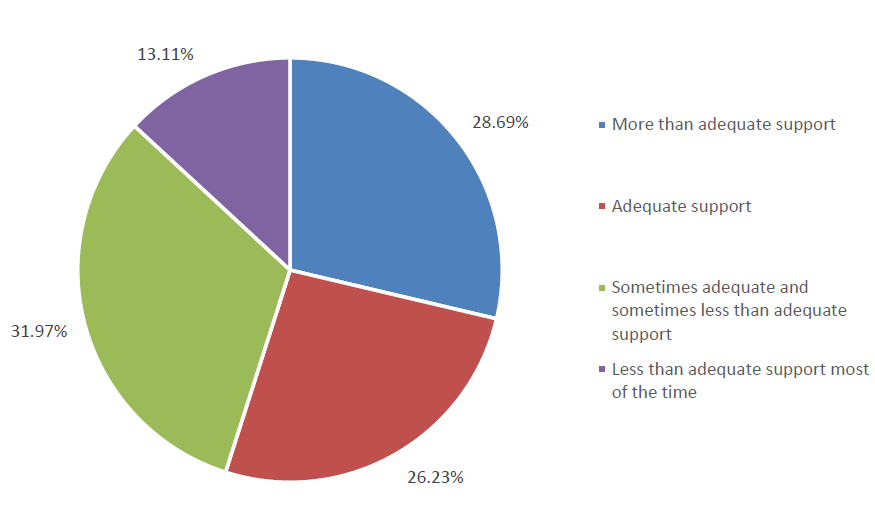
Most trainees felt that their supervisors had a good or fair understanding of the requirements of the Scheme for Registration. 68% found the feedback they received from their supervisors very or fairly useful, with 11% finding it not very useful or not useful at all.
What supervision involves
The majority of supervisors and pre-reg trainees are working together in the same location, and the vast majority of pre-reg trainees said that there was someone available on the premises to support them all or some of the time:
- 75% of supervisors said that they periodically or occasionally observe appointments
- 8% observe all appointments
- 17% said "I don’t usually observe appointments"
Trainees described a similar picture, with:
- 1% saying that all their appointments were observed
- 78% saying that there was periodic observation
- 20% saying that none of their appointments were observed
Free text answers indicated that checks are made to be sure that there is safe practice (eg checking of fundus photos), but nonetheless around a fifth of trainees do not have their interactions with patients observed.
Did your supervisor sit in to observe your sight tests or contact lens appointments?
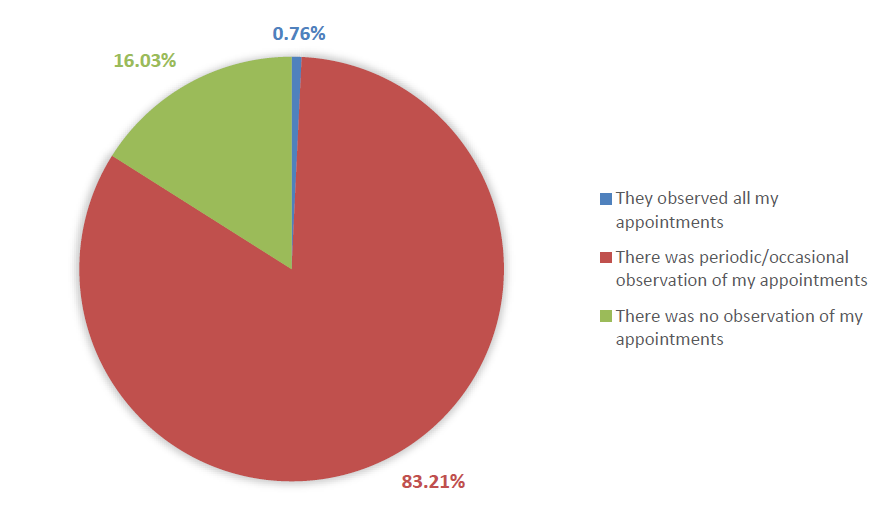
All trainees reported a number of interactions with their supervisor to check their progress.
Interaction |
% of trainee respondents reporting this interaction |
| Monthly meetings | 22.09 |
| Feedback following sight test observation |
44.79 |
| Discussion of pre-reg review forms |
29.45 |
| Discussion of your logbook |
31.90 |
| Discussion of your pre-reg assessments | 84.05 |
Time available for supervision
54% of supervisors feel that the support they are given to supervise their trainees is "sometimes adequate", "sometimes less than adequate" or "less than adequate most of the time". 17% said they had more than adequate support.
Which option best describes the support your workplace allows you to give your pre-reg trainees with their appointments?
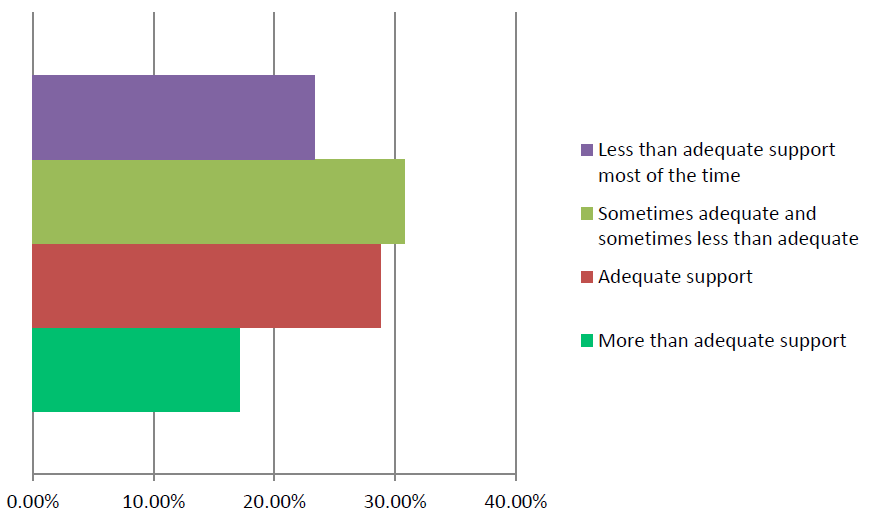
Asked what the biggest barriers were to providing adequate support, the vast majority of supervisors mentioned time. In the box below are several quotes that are typical of the majority.
A minority (39%) of trainees felt that they got enough time with their supervisor.
In your opinion, did you have adequate time for feedback and support from your supervisor (or supervisors)?
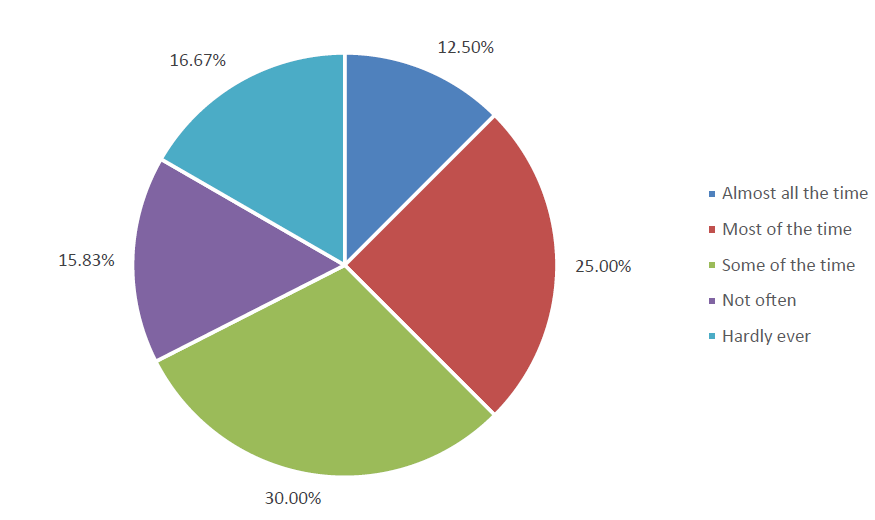 Both groups reported that they had to "find" the time for supervision and support within the day, with over 20% reporting that they used their own time, during what should have been breaks, or Q12 Is/was time with your pre-reg trainees for supervision usually?
Both groups reported that they had to "find" the time for supervision and support within the day, with over 20% reporting that they used their own time, during what should have been breaks, or Q12 Is/was time with your pre-reg trainees for supervision usually?
Is/was time with your pre-reg trainees for supervision usually?
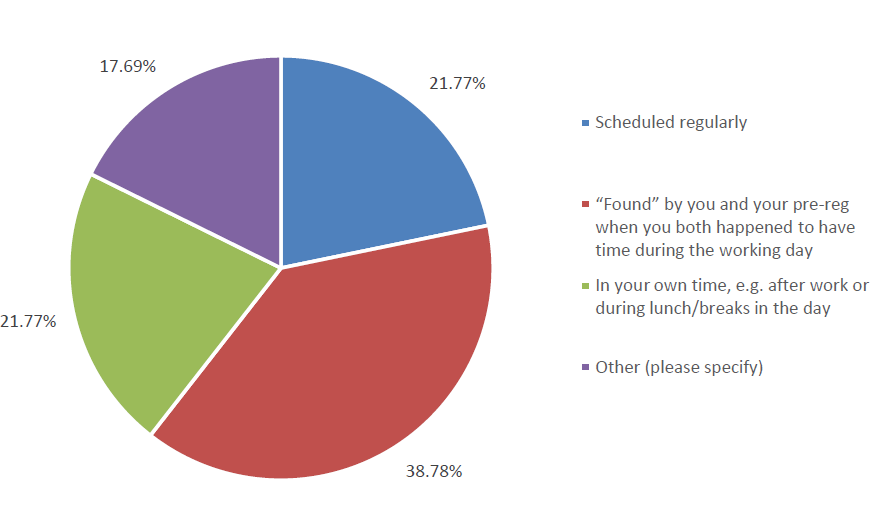
Was time with your supervisor:
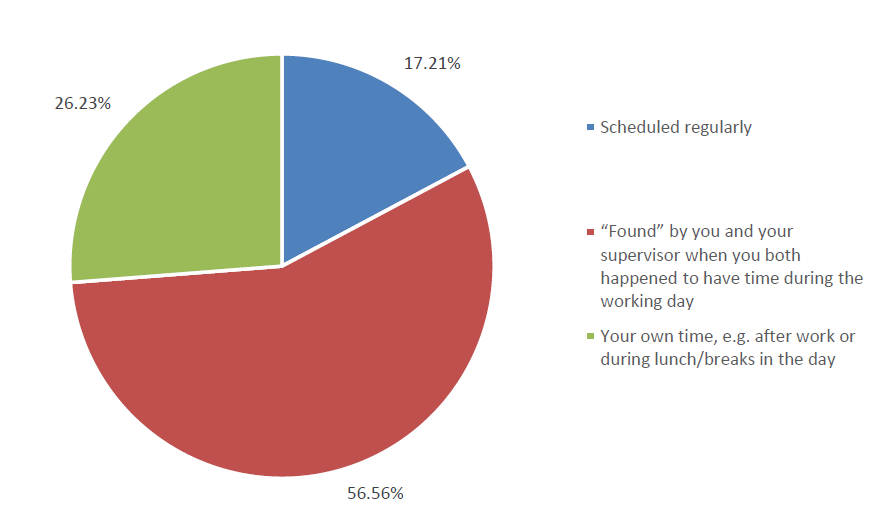
Expectations and pressures - on pre-reg trainees
Trainees reported that they were not generally expected to carry out a full workload for at least the first six months of their training period. However, 21% of trainees were expected to meet commercial targets from day one, and 35% of trainees were not asked to meet commercial targets at any stage in their training.
Expectations and pressures - on supervisors
The majority of supervisors had some control over the decision whether to be a supervisor and most found it rewarding, at least some of the time. However, as discussed above, the majority of supervisors felt that they did not have support to give enough time to their trainees.
Discussion
Of those recent pre-regs who responded to the survey, most felt that overall, the support they received was adequate or better than adequate, but a significant minority said it was sometimes less than adequate. The majority of supervisors found lack of time to be the biggest barrier to providing adequate support to their trainees. And both groups reported having to find the time to meet to discuss their work and progress, rather than having it scheduled.
These results show that the system for providing supervision for pre-reg optometrists is run with limited resources, and where it functions effectively, as it does much of the time, this is largely due to the good will of both supervisors and trainees.
In our view there is a structural problem in the funding of pre-reg optometry training.
The College of Optometrists' Scheme for Registration, run under GOC accreditation, is focused on assessing trainees against fulfilment of the GOC's Stage 2 competencies. Quality assurance arrangements are in place for all elements of the assessment, while the Scheme includes mechanisms to ensure that trainees fulfil the GOC's patient episode requirements and that supervision arrangements for individual trainees fulfil the GOC criteria for these. The College provides supervisor training, and trainees can raise concerns with the College about their placement experience, which will be followed up. But the College and Scheme do not have responsibility for assuring the quality of trainees' supervised practice placements.
The current NHS grant to practices for pre-registration supervision is inadequate at around £3,700. (And as the pre-reg grant is part of GOS funding, it is not available at all for hospital pre-reg placements). This is well below the levels of NHS funding of clinical experience for other professions Pharmacy pre-registration grants are over £18,000, and like other healthcare professions they receive support for placements and training from Health Education England.
The pre-registration grant for optometry broadly covers the costs of assessment but is insufficient to enable optical practices to give supervisors dedicated time to support pre-registration trainees. Many supervisors are providing supervision alongside a full clinical workload of their own. In these circumstances it is unsurprising that employers expect trainees to contribute to practice income at an early stage, but this can detract from quality clinical training.
Summary and conclusions
The results of our surveys reinforce our concerns about the resourcing of the new education system proposed by the GOC's ESR.
The average optical practice in which a person does their pre-reg training is a pressured environment, in which supervisors are not given protected time to carry out support, as there is not funding for this available. Both supervisors and trainees describe a system in which it is hard to find time to carry out supervision or review progress. Because of inadequate NHS funding, a lot seems to depend on goodwill, and it does not seem that most employers put supervision time in the diary.
In the NHS, supervision and training time is usually built into professionals' contracts. This is not the case in community optics. Primary care optical practices that offer pre-registration places do so from a combination of motives, including a wish to contribute to the future of the profession; a recognition that the pre-reg student will become an economically-valuable member of staff in due course; and, for some, the chance to identify individuals who will one day take over the practice. In optics, unlike the NHS, these short-, medium- and long-term benefits will all have to be balanced against the short-term need to make a profit.
Any change to the current system that relies on good supervision in workplaces but does not provide adequate funding and assurance for it, will not succeed.
